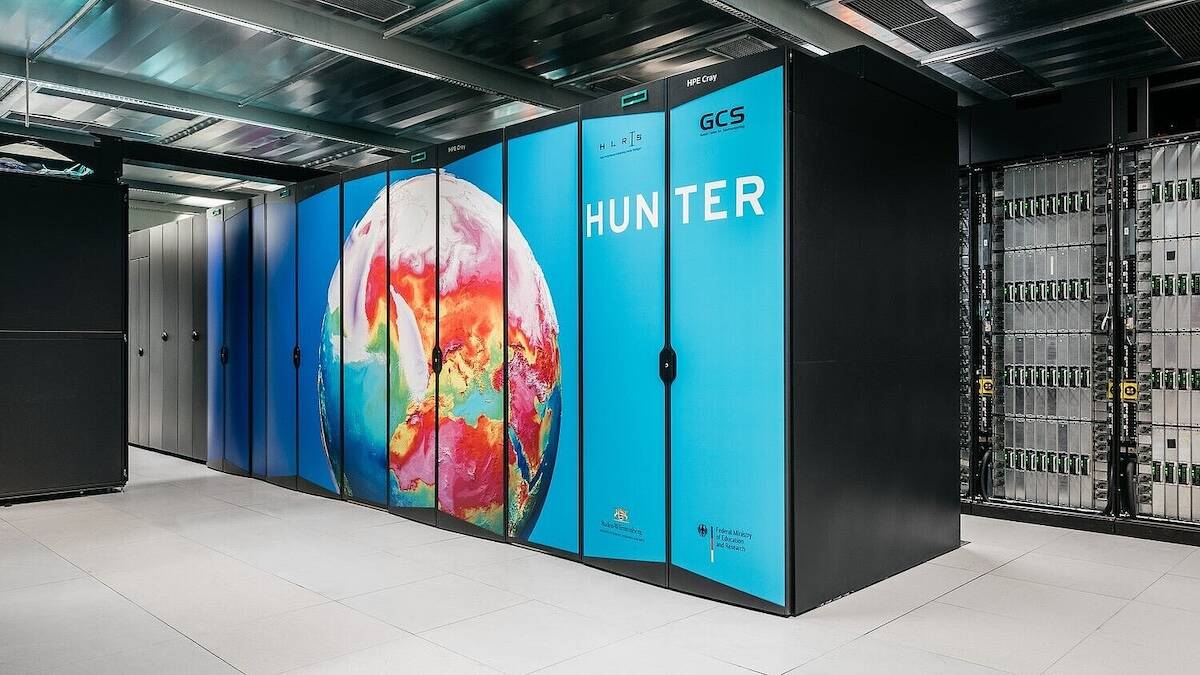Germany Unleashes AMD-powered Hunter Supercomputer

Hundreds of AMD APUs fired up on Thursday as Germany's High-Performance Computing Center (HLRS) at the University of Stuttgart announced the completion of its latest supercomputer dubbed Hunter.
The €15 million system, paid for by the Baden-Württemberg Ministry for Science, Research, and Art and Germany's Federal Ministry of Education and Research will support a variety of public and private research endeavors ranging from engineering and weather modeling to biomedical research, materials science, and yes, of course, AI.
Built by Hewlett Packard Enterprise, Hunter is based on a Cray EX4000 platform and powered by a combination of AMD Instinct MI300A accelerated processing units (APUs) and Epyc Genoa CPUs.
If that config sounds vaguely familiar, that's because the machine is based on the same building blocks as the 1.74 exaFLOP El Capitan supercomputer, only much, much smaller.
While El Capitan is powered by 44,544 APUs, Hunter features 752 spread across 188 liquid-cooled nodes. Each of these accelerators boasts 24 Zen 4 cores, six CDNA 3 GPU tiles and 128GB of coherent HBM3. The APUs are complemented by an additional 512 32-core Epyc processors.
Combined, HLRS estimates a peak theoretical double precision performance of 48.1 petaFLOPS, nearly twice that of its predecessor Hawk. However, that's for highly precise scientific workloads. The University also plans to put the system to work on a variety of AI applications, including model training, where the MI300A's BF16 and FP8 datatypes should deliver peak performance between 736 petaFLOPS and 1.47 exaFLOPS depending on precision.
In fact, under a public-private partnership, HLRS says German AI startup Seedbox.ai is already using the system to train open large language models (LLM) in 24 European languages.
"The rapid development of AI and an increased focus on sustainability in supercomputing mean that high-performance computing is currently going through an exciting transformative period," Michael Resch, director of HLRS, said in a statement.
Speaking of sustainability, one of Hunter's unique features is a new "dynamic power capping" functionality developed in collaboration with HPE. The capability is designed to optimize the system's energy efficiency by continuously monitoring the applications and tuning power distribution based on demand. Early testing on the Hawk supercomputer showed a 20 percent reduction in power consumption without significant performance trade-offs.
- Microsoft unveils beefy custom AMD chip to crunch HPC workloads on Azure
- Nvidia shovels $500M into Israeli boffinry supercomputer
- UK unveils plans to mainline AI into the veins of the nation
- LLNL's El Capitan surpasses Frontier with 1.74 exaFLOPS performance
From Hunter to Herder
While 48 petaFLOPS won't put Hunter anywhere close to the Top500's top 10, it was never intended to. Instead, Hunter is a transitional system designed to help researchers prepare and optimize their code for APUs and GPUs in anticipation of the larger Herder supercomputer.
Like Hunter, Herder will be built by HPE's Cray division and boast GPU-based architecture capable of churning out "several hundred petaFLOPS" of what we assume is double precision performance. The combined cost for both systems is €115 million.
Construction of the shell and power facilities for Herder is expected to begin in the near future, with installation of the completed system slated for sometime in 2027. ®
From Chip War To Cloud War: The Next Frontier In Global Tech Competition
The global chip war, characterized by intense competition among nations and corporations for supremacy in semiconductor ... Read more
The High Stakes Of Tech Regulation: Security Risks And Market Dynamics
The influence of tech giants in the global economy continues to grow, raising crucial questions about how to balance sec... Read more
The Tyranny Of Instagram Interiors: Why It's Time To Break Free From Algorithm-Driven Aesthetics
Instagram has become a dominant force in shaping interior design trends, offering a seemingly endless stream of inspirat... Read more
The Data Crunch In AI: Strategies For Sustainability
Exploring solutions to the imminent exhaustion of internet data for AI training.As the artificial intelligence (AI) indu... Read more
Google Abandons Four-Year Effort To Remove Cookies From Chrome Browser
After four years of dedicated effort, Google has decided to abandon its plan to remove third-party cookies from its Chro... Read more
LinkedIn Embraces AI And Gamification To Drive User Engagement And Revenue
In an effort to tackle slowing revenue growth and enhance user engagement, LinkedIn is turning to artificial intelligenc... Read more

